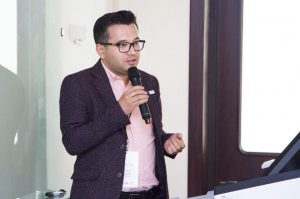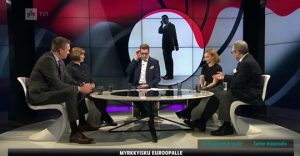As we start the year 2020 with a new blog-page “Global Process and Flows in the Eurasian Space”, this blog will become a channel for all our projects. We start by introducing our researchers, to give you a glimpse of the hectic academic life in our field.
To get an understanding of the life of a post-doctoral researcher, our researcher Sherzod Eraliev is a good example. His career has already landed him on three different continents and several cities. There is no time to stop, if one wishes to stay in the game. And a lot, of course, also depends on good luck.
After leaving his home country, Uzbekistan, he arrived in the United Kingdom where he studied International Politics at the University of Manchester in MA programme of the Faculty of Humanities (2009). After having worked in several international organizations in his home country, he then continued to his doctoral studies in the University of Tsukuba, Japan, where he also defended his thesis “Securitized migration? Russian policies vis-à-vis Central Asian labour migrants” in 2018.
A post-doctoral career opened for Sherzod in the Migration, Shadow Economy and Parallel Legal Orders (MISHA) project, at the University of Helsinki. Our senior researcher Rustam Urinboyev was granted a Marie Curie Fellowship for 2018-2019, which meant that our project was able to open a position for a new team member. Currently, Sherzod works as a post-doctoral fellow, funded by the KONE Foundation grant. His background and research interests have allowed us to expand our activities in the Eurasian studies beyond the MISHA project.
Last year, Sherzod Eraliev participated in a two-month fellowship at the George Washington University – Elliott School of International Affairs’ Central Asia Program. He participated in tailor-made programs and was introduced to U.S. policy and expert communities in Washington, D.C. His research during the fellowship focused on the return migration of highly skilled Uzbek migrants. He delivered a speech at Carnegie Endowment for International Peace on his research findings. He gave an interview to Voice of America’s Uzbek Service on Russia’s migration policies, Uzbek migrants in Russia, latest changes in Uzbekistan. Sherzod also published an op-ed at The Diplomat about the return perspectives of highly skilled Uzbek migrants. His research findings on this topic was later published in an e-book by the above-mentioned. In June, he participated in the Russian Readings at Oxford, where he delivered a lecture on the religiosity of migrants in Russia.
In the fall, Sherzod travelled to Moscow for a two-week fieldwork to interview both migrants and migration experts. He reported on his adventures in our project Facebook page, attracting interests in our page followers.
This year, life is getting busier still. He has ongoing works for several publications and plans to travel to conferences, workshops and meetings. He is also the Coordinator for the Aleksanteri Conference 2020: Eurasia and Global Migration in October, which means working together with the organizing committee during the spring and fall.
And what about his personal life? Finland is now the third country where he has settled, this time with a family of two children. Finding an apartment, getting paper work in order, arranging children´s schools and day care, and language courses – it also takes time. On the first day of 2020, his family welcomed a new addition. So, there is certainly life outside of one´s work!

 He participated in an international conference “Uzbekistan 2035” in Tashkent on the 28-29th of June, where his talk on anti-corruption reforms prompted great interest by the Uzbek government, among others the Ministry of Justice and the Academy of General Prosecutor’s Office. It is very gratifying to see how our work bears fruit at this level of societal relevance!
He participated in an international conference “Uzbekistan 2035” in Tashkent on the 28-29th of June, where his talk on anti-corruption reforms prompted great interest by the Uzbek government, among others the Ministry of Justice and the Academy of General Prosecutor’s Office. It is very gratifying to see how our work bears fruit at this level of societal relevance! pportunity to participate in wider societal and political discussions on Russia´s developments. The year started with an appearance in a Finnish broadcasting company YLE´s political talk show (5.4.2018, A-Studio:Talk, journalist Jan Andersson) in which Anna-Liisa discussed difficult Russia-EU relations.
pportunity to participate in wider societal and political discussions on Russia´s developments. The year started with an appearance in a Finnish broadcasting company YLE´s political talk show (5.4.2018, A-Studio:Talk, journalist Jan Andersson) in which Anna-Liisa discussed difficult Russia-EU relations.